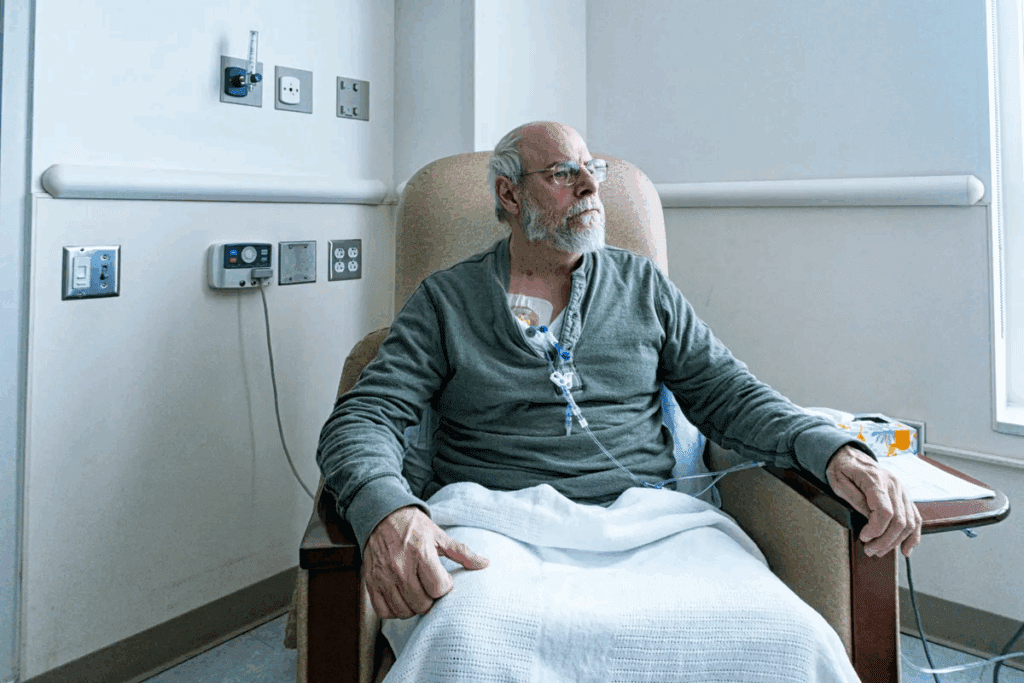Last Updated on November 26, 2025 by Bilal Hasdemir

Colon cancer used to be rare in young people. But now, it’s happening more often in those under 50. Studies show a big rise in cases among the young, highlighting the need to know the symptoms of colon cancer in young females.
It’s important to know the warning signs to catch it early. At Liv Hospital, we stress the need for awareness and quick medical help. With more young people getting colon cancer, they need to learn about the symptoms.
Knowing the signs can save lives. Young adults often don’t get screened regularly. But being aware of health risks can greatly improve chances of beating the disease.

Colon cancer in young adults is becoming more common. This challenges the old idea that it only affects older people. Almost 9 out of 10 cases used to be in people over 60. But now, we’re seeing a change.
Colon cancer is being diagnosed more often in young adults. Studies show a big increase in this group. This trend is happening not just in the U.S. but worldwide.
| Age Group | Percentage of Colon Cancer Cases | Trend |
| Under 50 | Increasing | Rising at an alarming rate |
| 50-60 | Stable | Gradual increase |
| Over 60 | Majority | High incidence |
The statistics are stark: More young adults are getting colon cancer. This shows we need to spread awareness and catch it early.
There are many reasons why young adults are getting colon cancer more often. Genetic predispositions, lifestyle changes, and environmental influences are some of them.
Lifestyle choices like diet and exercise levels matter a lot. Eating too much processed food and not enough fiber, and being inactive, can increase your risk.
The idea that colon cancer is rare is being questioned. While most cases are in older people, the rise in young adults changes our view.
It’s important to understand that colon cancer can happen to anyone, no matter their age. Awareness and screening are key to fighting this disease.

Colorectal cancer in young adults is becoming more common. We need to know more about its causes and early signs. This cancer affects the colon or rectum, causing abnormal cell growth.
Colon cancer, also known as colorectal cancer, starts in the colon or rectum. It often begins as a harmless polyp. If not removed, it can turn into cancer. The most common type is adenocarcinoma.
Key Facts About Colon Cancer:
In younger people, colon cancer can be caused by genetics, environment, and lifestyle. Unlike older adults, younger people may have a stronger genetic link. They might also face different risk factors.
Colon cancer is more common in people over 50. But there’s a worrying increase in cases among younger adults. Recent data shows more adults under 50 are getting diagnosed with colon cancer.
| Age Group | Colon Cancer Incidence |
| Under 50 | Increasing incidence |
| 50 and above | Higher incidence, but decreasing in some populations due to screening |
To understand your risk of colon cancer, look at your family history, genetics, and lifestyle. While younger adults have a lower risk, knowing the signs is key to early detection.
Early detection significantly improves the chances of successful treatment.
It’s important to know the risk factors for colon cancer in young adults. This knowledge helps in early detection and prevention. Colon cancer is often seen in older adults, but it’s becoming more common in younger people.
Genetics plays a big role in colon cancer, more so in young adults. Syndromes like Lynch syndrome and Familial Adenomatous Polyposis (FAP) raise the risk. If you have a family history of these, talk to your doctor about screening.
Lifestyle and environment also affect colon cancer risk in young adults. Eating too much processed food and not enough fiber, being overweight, and not exercising can increase risk. Exposure to toxins and pollutants also matters.
A family history of colon cancer is a big risk factor. If close relatives have had it, you should watch your health closely. Consider getting screened early.
The risk of colon cancer in young adults is low but rising. The numbers show more colon cancer in people under 50. It’s key for young adults to know the signs of colon cancer in young adults and talk to their doctor about their risk.
Knowing these risk factors helps young adults take steps to lower their risk. It also ensures early detection if colon cancer is present.
Colon cancer rates are rising in young adults. Early detection is key to saving lives. It’s not just about better treatment; it’s about survival.
Early detection of colon cancer greatly improves survival chances. Studies show that the five-year survival rate is about 90% if caught early. This highlights the importance of catching it early.
Young people often face delays in getting diagnosed. This is because colon cancer is seen as a disease of older adults. As a result, young people may not get screened as often, and symptoms are often ignored.
Young adults need to know their risk for colorectal cancer. While it’s not common in this age group, certain factors can raise your risk. These include family history, genetic predispositions, and lifestyle choices.
| Risk Factor | Description | Impact on Risk |
| Family History | Having a first-degree relative with colon cancer | Increased risk |
| Genetic Predispositions | Presence of genetic syndromes like Lynch syndrome | Significantly increased risk |
| Lifestyle Factors | Diet, physical activity level, smoking, and alcohol consumption | Variable impact |
Knowing your risk factors and the importance of early detection can help young adults protect their health.
Colon cancer is becoming more common in young women. It’s important to know its symptoms early. Symptoms in young women can be hard to spot and often look like normal menstrual issues.
Young women often think their symptoms are just from their periods. Symptoms like bloating, stomach pain, and changes in bowel habits can be signs of colon cancer. It’s key to know when these symptoms might mean something more serious.
Bloating and abdominal pain are common in young women, often linked to menstrual cramps or PMS. But if these symptoms are persistent or severe, they could be signs of colon cancer.
Colon cancer symptoms in young women can be tricky to spot early. Some early signs include:
Knowing when symptoms might mean colon cancer is key. If you have symptoms that don’t fit your menstrual cycle, see a doctor. Don’t ignore unusual or ongoing symptoms without checking them out.
By staying informed and alert, young women can help catch colon cancer early. This could lead to better treatment and outcomes.
Colon cancer is becoming more common in young adults, including men. It’s important to know the early signs. This is because colon cancer is not just a disease of older people anymore.
Studies show that colon cancer can show up differently in men, and even more so in young men. Symptoms might include changes in bowel habits, like diarrhea or constipation. You might also feel abdominal pain or discomfort.
In young men, colon cancer can also show up with less obvious symptoms. These can include unexplained weight loss or feeling very tired. It’s key for young men to watch out for these signs and see a doctor if they don’t go away.
The early signs of colon cancer in young men can be subtle. They might not seem related to the disease at first. These signs include:
Being aware of these symptoms and getting checked by a doctor can help catch the disease early. This can lead to better treatment options.
While colon cancer is rare in young men, it’s becoming more common. Studies show that the rate of colon cancer in adults under 50 is going up. Experts think this trend will continue.
Knowing the signs and risk factors of colon cancer helps young men stay healthy. They can talk to their doctors about screening options.
It’s important to know the early signs of colon cancer. Catching it early makes treatment easier. Young adults should be aware of these symptoms.
Changes in bowel habits, like diarrhea or constipation, could mean colon cancer. Watch for any unusual changes that last more than a few days. If your bowel habits change suddenly, talk to a doctor.
Abdominal pain or discomfort that doesn’t go away could be colon cancer. This pain might be constant or come and go. Don’t ignore ongoing abdominal issues without checking with a doctor.
Seeing blood in your stool or during bowel movements is a clear sign of colon cancer. If you notice blood, get medical help right away. Blood in the stool is not normal and needs a doctor’s check-up.
Unexplained weight loss can be a sign of many health problems, including colon cancer. If you lose weight without trying, it’s a sign to see a doctor. Keep an eye on your weight and health to spot any unexpected changes.
Knowing these warning signs can help find colon cancer early. If you notice any of these symptoms, see a healthcare provider without delay.
Young adults often face challenges when trying to get medical attention for colon cancer symptoms. It’s important to know when to push for further investigation. Also, how to advocate for yourself in a medical setting.
Being proactive about your health is key. If you’re experiencing symptoms that concern you, don’t hesitate to express these concerns to your healthcare provider. Keep a symptom journal to track when symptoms occur, their severity, and any factors that seem to trigger or relieve them.
If your initial consultation doesn’t lead to a clear diagnosis or plan, it’s essential to know what tests to request. Fecal occult blood tests (FOBT) can detect hidden blood in the stool, which may indicate colon cancer. A colonoscopy is a more definitive diagnostic tool, allowing for the direct visualization of the colon and rectum.
Other tests that might be recommended include:
It’s not uncommon for young adults to be met with dismissal when bringing up concerns about colon cancer. If you’re told you’re too young to be at risk, emphasize your specific symptoms and any risk factors you may have, such as a family history of colon cancer.
When discussing your symptoms with a healthcare provider, be sure to mention:
By being informed and assertive, you can overcome the barrier of age. And receive the medical attention you need.
Colon cancer rates are rising in young adults. It’s key to know the screening guidelines and how to get diagnosed. This knowledge helps find cancer early and treat it better.
The American Cancer Society says adults should start screening at 45 if they’re at average risk. But my group with a family history or other risks might need to start sooner.
Key factors influencing screening guidelines include:
If a first-degree relative (like a parent or sibling) got colon cancer before 50, you might need to start screening early. For example, if a parent got it at 40, start at 30.
Diagnostic tests for colon cancer include:
Some symptoms mean you should get screened right away, even if you’re young. These include:
| Symptom | Description |
| Rectal Bleeding | Blood in the stool or black, tarry stools |
| Changes in Bowel Habits | Diarrhea or constipation that lasts |
| Abdominal Pain | Cramping or discomfort in the abdomen |
| Unexplained Weight Loss | Significant weight loss without a clear reason |
Knowing these symptoms and the screening guidelines can help young adults stay healthy. If you notice any of these or have concerns, talk to a doctor.
It’s important to know the signs of colon cancer in young women. This knowledge helps in catching the disease early. Being aware of symptoms and risk factors can greatly improve your health.
Young adults should take care of their health. If you notice unusual symptoms like persistent pain, bleeding, or weight loss, see a doctor. Early detection is key to better survival chances.
Stay informed and look out for your health. This way, you can lower your risk and get help quickly if needed. Being proactive is essential in fighting colon cancer.
Colon cancer is more common in older adults. But cases in young adults are increasing. It’s important to know the symptoms and risk factors.
Look out for changes in bowel habits and persistent pain. Also, watch for rectal bleeding, blood in stool, and unexplained weight loss.
It can develop due to genetic predispositions, lifestyle choices, and environmental factors.
Risk factors include family history, genetic predispositions, diet, physical activity, and environmental influences.
Yes, symptoms can be mistaken for menstrual issues. It’s important to be aware of beyond regular female health concerns.
While rare, cases in young men are increasing. Recognizing signs and symptoms is key.
Chances vary based on risk factors like family history, genetics, and lifestyle choices.
It’s more common in adults over 50.
Butcases
In younger adults are rising. Awareness across age groups is important.
Guidelines suggest starting at age 45. Those with risk factors may need to start earlier.
Ask your doctor about a colonoscopy, stool tests, or other procedures if you’re concerned or have risk factors.
Be open with your doctor about symptoms, concerns, and risk factors. Don’t hesitate to ask questions or seek a second opinion.
Odds vary based on individual risk factors. Being aware of signs and symptoms can help with early detection and treatment.
Andrews, S., et al. (2013). Gallstone size e related to the incidence of post-cholecystectomy retained bile duct stones. Surgery Journal, 5(3), 143-147. Retrieved from https://www.sciencedirect.com/science/article/pii/S1743919113000484
Subscribe to our e-newsletter to stay informed about the latest innovations in the world of health and exclusive offers!